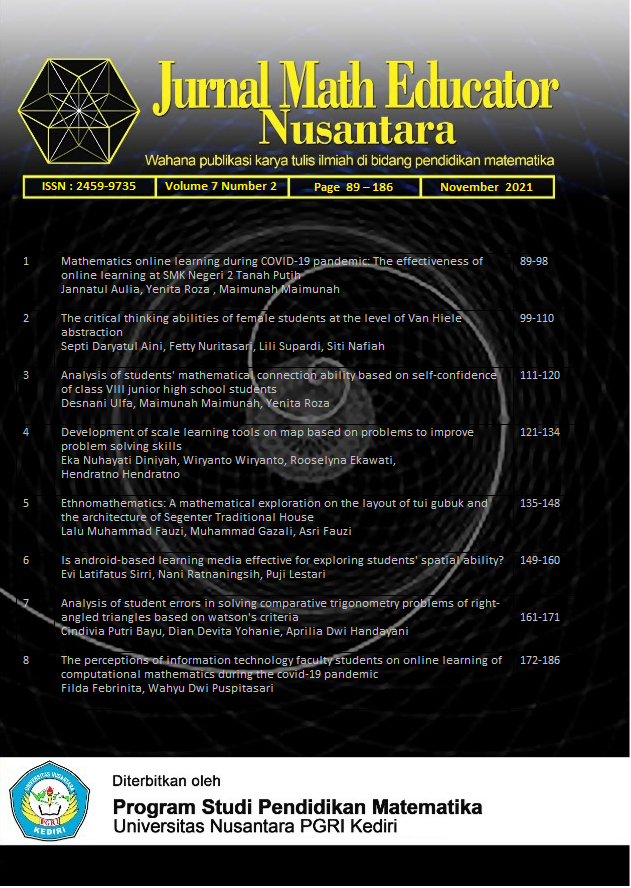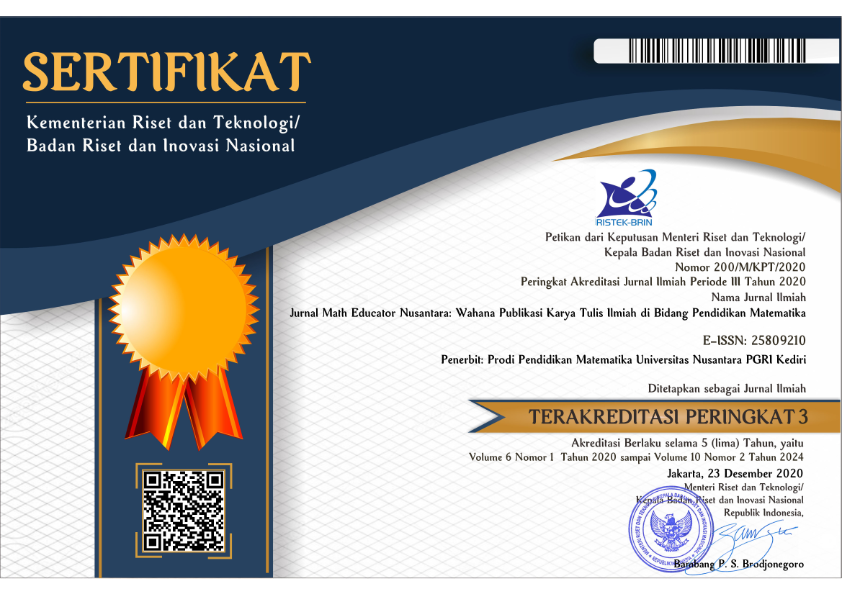The perceptions of information technology faculty students on online learning of computational mathematics during the covid-19 pandemic
DOI:
https://doi.org/10.29407/jmen.v7i2.16606Keywords:
Perception, online learning, Pandemic, Covid-19Abstract
The implementation of online learning in computational mathematics courses has encountered various obstacles in addition to the decline in student learning outcomes. Therefore, research is aimed to explore student perceptions of online learning that has been carried out. The research used a descriptive method with a quantitative approach. The research subjects were students of the Information Technology Faculty of Unisba Blitar who had taken computational mathematics courses during the Covid-19 pandemic. The results showed that students had a positive perception of the aspects of the learning process although some students felt difficulty understanding theory and skills improvement. Positive perceptions are also shown in the competence aspect of lecturers, who become facilitators in the learning process. Furthermore, in the aspect of facilities and infrastructure, positive perceptions are shown in the ease of access to learning materials, the availability of online learning tools and the use of video conferencing in learning. Meanwhile, the negative aspect is shown in the fulfilment of the internet quota for online learning.
References
Adiyanta, F. C. S. (2019). Hukum dan Studi Penelitian Empiris: Penggunaan Metode Survey sebagai Instrumen Penelitian Hukum Empiris. Administrative Law and Governance Journal, 2(4), 697–709. https://doi.org/10.14710/alj.v2i4.697-709
Arikunto, S. (2013). Prosedur Penelitian Suatu Pendekatan Praktik. Jakarta : Rineka Cipta.
Christiaens, W., Spooren, P., Mortelmans, D., & Van Loon, F. J. A. (2014). Students’ Perceptions of Learning, Course Grades, and Student Evaluation of Teaching: An Empirical Analysis. International Journal of Assessment and Evaluation, 20(3), 13–21. https://doi.org/10.18848/2327-7920/cgp/v20i03/48350
Devesh, S., & Nasseri, D. AL. (2014). Effectiveness of Mathematics Module in Foundation Programme in Majan College. International Journal of Emerging Engineering Research and Technology, 2(1), 1–7. www.ijeert.org
Febrinita, F., & Amalia, R. (2021). Profil Learning Trajectory Mahasiswa dalam Memecahkan Masalah Statistika Ditinjau dari Level Kemampuan Kognitif. JPM: JURNAL PENDIDIKAN MATEMATIKA, 7(1), 9–19.
Guilford, J. P. (1956). Fundamental Statistic in Psychology and Education. 3rd Ed. (3rd ed.). McGraw-Hill Book Company, Inc.
Gustiani, S. (2020). Students ’ Motivation in Online Learning During Covid-19 Pandemic Era : a Case Study. Holistics Journal, 12(2), 23–40.
Marmah, A. A. (2014). Students’ Perception about the Lecture as a Method of Teaching in Tertiary Institutions. Views of Students from College of Technology Eduction, Kumasi (COLTEK). International Journal of Education and Research, 2(6), 601–612.
Maulana, H. A., & Hamidi, M. (2020). Persepsi Mahasiswa terhadap Pembelajaran Daring pada Mata Kuliah Praktik di Pendidikan Vokasi. Equilibrium: Jurnal Pendidikan, 8(2), 224–231. https://doi.org/10.26618/equilibrium.v8i2.3443
Mustofa, M. I., Chodzirin, M., & Sayekti, L. (2019). Formulasi Model Perkuliahan Daring Sebagai Upaya Menekan Disparitas Kualitas Perguruan Tinggi (Studi terhadap Website pditt.belajar.kemdikbud.go.id). Walisongo Journal of Information Technology, 1(2), 151–160. https://doi.org/10.21580/wjit.2019.1.2.4067
Niam, M. Y., Fuadiyah, M., & Wijayanti, E. (2020). Students’ Learning Motivation in Online Practicum Courses during COVID-19 Pandemic: A Case of Walisongo State Islamic University. Jurnal Pendidikan MIPA, 21(2), 120–131. https://doi.org/10.23960/jpmipa/v21i2.pp120-131
Ningsih, S. (2020). Persepsi Mahasiswa Terhadap Pembelajaran Daring Pada Masa Pandemi Covid-19. JINOTEP (Jurnal Inovasi Dan Teknologi Pembelajaran): Kajian Dan Riset Dalam Teknologi Pembelajaran, 7(2), 124–132. https://doi.org/10.17977/um031v7i22020p124
Qurbani, D. (2017). Peningkatan Kompetensi Dosen Dalam Cara Mengajar Melalui Pengembangan Training Need Analysis (Studi Kasus Di Prodi Manajemen Fakultas Ekonomi Universitas Pamulang). Jimf (Jurnal Ilmiah Manajemen Forkamma), 1(1), 112–133.
Rakhmanina, L., Martina, F., Halolo, F. B., Syafryadin, & Noermanzah. (2020). Students’ Perception on Online English Learning During Covid-19 Pandemic Era. SILAMPARI BISA : Jurnal Penelitian Pendidikan Bahasa Indonesia, Daerah, Dan Asing, 3(2), 428–439.
Sadikin, A., & Hamidah, A. (2020). Pembelajaran Daring di Tengah Wabah Covid-19. BIODIK : Jurnal Ilmiah Pendidikan Biologi, 6(2), 109–119. https://doi.org/10.22437/bio.v6i2.9759
Saragih, O., Sebayang, F. A. A., Sinaga, A. bemby, & Ridlo, M. R. (2020). Persepsi Mahasiswa Terhadap Pembelajaran Daring Selama Pandemi Covid-19. Tarbiyah Wa Ta’lim: Jurnal Penelitian Pendidikan & Pembelajaran, 7(3), 178–191.
Saragih, S., Markus, T., Rhian, P., & Setiawan, S. (2021). Eksplorasi Kesiapan Dosen Dan Mahasiswa Menjalani Pembelajaran Jarak Jauh Di Masa Pandemi Covid-19. Kwangsan: Jurnal Teknologi Pendidikan, 9(1), 124. https://doi.org/10.31800/jtp.kw.v9n1.p124--141
Schoenfeld, A. H. (2017). Uses Of Video In Understanding And Improving Mathematical Thinking And Teaching. Journal of Mathematics Teacher Education, 20(5), 415–432. https://doi.org/10.1007/s10857-017-9381-3
Sirjon, Setyaningsih, D., Sri, E. M., & Mamma, A. T. (2021). Persepsi Mahasiswa Terhadap Pembelajaran Daring Pada Masa Pandemi Covid-19 dan Hubungannya dengan Partisipasi Mahasiswa dalam Pembelajaran di Program Studi PG PAUD Universitas Cenderawasih. Eduka : Jurnal Pendidikan, Hukum, Dan Bisnis, 6(1), 33–47.
Su, F., & Wood, M. (2012). Emerald Article: What Makes A Good University Lecturer? Students’ Perception Of Teaching Excellence. Journal of Applied Research in Higher Education, 4(2), 142–155. https://doi.org/10.1108/17581181211273110
Sugiyono. (2013). Metode Penelitian Kuantitatif Kualitatif dan R&D. Bandung : Alfabeta.
Tanjung, F. Z., & Utomo, A. (2021). Investigating EFL Students’ Perception on Online Learning Amidst Covid-19 Pandemic. International Journal of Indonesian Education and Teaching, 5(1), 102–115. https://doi.org/10.24071/ijiet.v5i1.3053
Wargadinata, W., Maimunah, I., Dewi, E., & Rofiq, Z. (2020). Student’s Responses on Learning in the Early COVID-19 Pandemic. Tadris: Jurnal Keguruan Dan Ilmu Tarbiyah, 5(1), 141–153. https://doi.org/10.24042/tadris.v5i1.6153
Zhafira, N. H., Yenny, E., & Chairiyaton. (2020). Persepsi Mahasiswa Terhadap Perkuliahan Daring Sebagai Sarana Pembelajaran Selama Masa Karantina Covid-19. Jurnal Bisnis Dan Kajian Strategi Manajemen, 4(1), 37–45.
Downloads
Published
Issue
Section
License
Authors who publish with this journal agree to the following terms:
- Copyright on any article is retained by the author(s).
- The author grants the journal, the right of first publication with the work simultaneously licensed under a Creative Commons Attribution License that allows others to share the work with an acknowledgment of the work’s authorship and initial publication in this journal.
- Authors are able to enter into separate, additional contractual arrangements for the non-exclusive distribution of the journal’s published version of the work (e.g., post it to an institutional repository or publish it in a book), with an acknowledgment of its initial publication in this journal.
- Authors are permitted and encouraged to post their work online (e.g., in institutional repositories or on their website) prior to and during the submission process, as it can lead to productive exchanges, as well as earlier and greater citation of published work.
- The article and any associated published material is distributed under the Creative Commons Attribution-ShareAlike 4.0 International License














